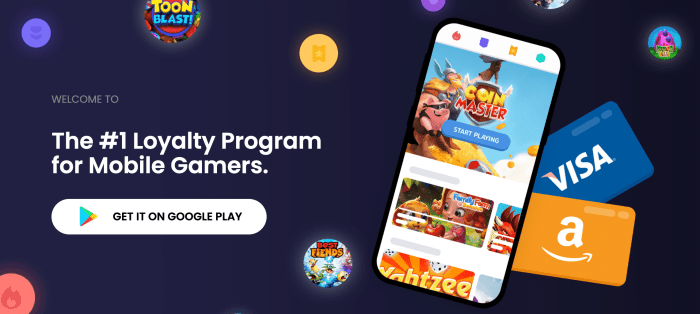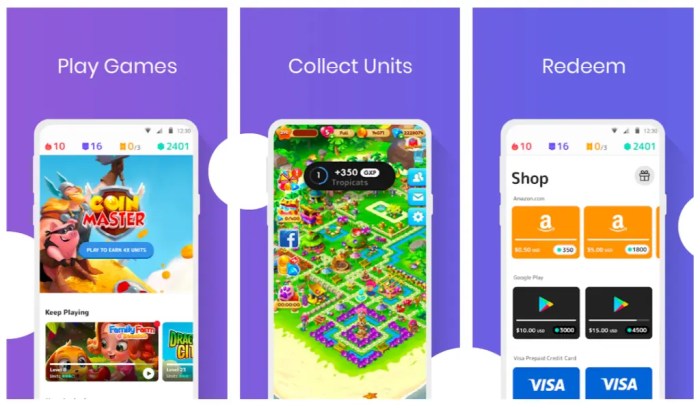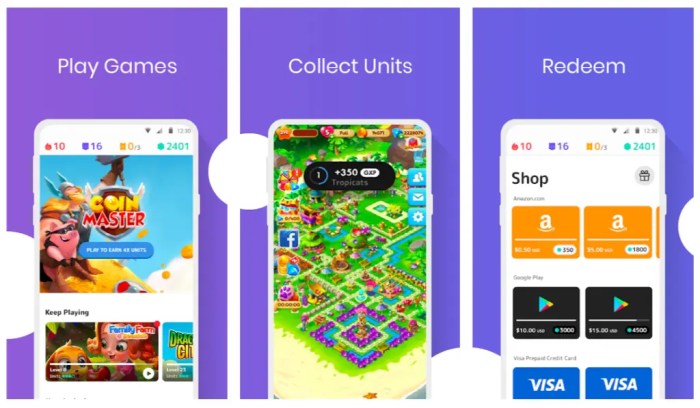Apps that pay to play games are becoming increasingly popular, offering users a unique way to earn extra income, enjoy entertainment, and develop skills. From casual puzzles to competitive multiplayer games, these apps provide a diverse range of options for gamers of all levels.
Whether you’re looking to supplement your income, find a new hobby, or simply earn rewards for your gaming time, this guide will provide you with all the information you need to get started with apps that pay to play games.
Overview of Apps that Pay to Play Games
Apps that pay to play games are mobile applications that reward users with real money or other incentives for playing games on their devices. These apps have become increasingly popular in recent years as a way for users to earn extra income or simply enjoy their favorite games while earning rewards.
There are various types of games offered by these apps, ranging from simple casual games to more complex strategy and role-playing games. Some of the most popular game genres include:
Casual Games
- Puzzle games
- Arcade games
- Card games
- Trivia games
Strategy Games
- Tower defense games
- Real-time strategy games
- Turn-based strategy games
Role-Playing Games
- Action RPGs
- Turn-based RPGs
- MMORPGs
Earning Mechanisms
Apps that pay to play games offer various earning mechanisms for users to generate money or rewards while engaging in gameplay.
The earning methods can differ depending on the app and its specific features. Some common ways users can earn include:
In-Game Currency
- Playing games and completing tasks or challenges within the app can reward users with in-game currency.
- This currency can then be used to purchase virtual items, upgrades, or other benefits within the game.
Gift Cards
- Some apps offer gift cards as rewards for reaching certain milestones or completing specific tasks.
- These gift cards can be redeemed for purchases at various online or physical stores.
Real Money
- A few apps allow users to earn real money through gameplay.
- This can be achieved by winning tournaments, completing surveys, or participating in other paid activities within the app.
Popular Apps
Many apps offer the opportunity to earn money while playing games. These apps vary in terms of game types, earning potential, and user reviews.
Here is a table listing some of the most popular apps that pay to play games:
| App Name | Game Types | Earning Potential | User Reviews |
|---|---|---|---|
| Mistplay | Casual games, puzzle games, strategy games | Up to $100 per month | 4.5 stars on Google Play |
| Swagbucks | Trivia games, surveys, shopping | Up to $50 per month | 4 stars on Google Play |
| InboxDollars | Surveys, watching videos, playing games | Up to $50 per month | 4 stars on Google Play |
| AppKarma | Casual games, puzzle games, action games | Up to $100 per month | 4 stars on Google Play |
| CashPirate | Surveys, watching videos, playing games | Up to $50 per month | 3.5 stars on Google Play |
The earning potential of these apps varies depending on the games played, the amount of time spent playing, and the user’s skill level.
It’s important to note that while these apps can be a fun way to earn some extra money, they are not a reliable source of income. Most users report earning only a few dollars per month.
Game Selection
Apps that pay to play games offer a diverse selection of games to cater to a wide range of preferences and skill levels. From casual puzzles to intense action shooters, there’s something for everyone.
The games available on these apps cover various genres, including arcade, strategy, role-playing, and simulation. They come with varying difficulty levels, from beginner-friendly to challenging experiences for seasoned gamers.
Social Features, Apps that pay to play games
Many of these apps also incorporate social features that enhance the gaming experience. Players can connect with friends, join guilds, and participate in multiplayer modes, adding a layer of competition and camaraderie.
User Experience: Apps That Pay To Play Games
The user experience of playing games on apps that pay to play can vary widely depending on the app and the games offered. Some apps offer a seamless and enjoyable experience, while others can be frustrating and buggy.
Game Quality
One of the most important factors that contribute to the user experience is the quality of the games. The best apps offer a wide variety of high-quality games that are fun and engaging to play. These games are typically well-designed and polished, with intuitive controls and clear objectives.
App Stability
Another important factor is the stability of the app. Apps that are prone to crashing or freezing can be very frustrating to use. The best apps are stable and reliable, so you can focus on playing your games without having to worry about technical issues.
Customer Support
Finally, the quality of customer support can also impact the user experience. If you have a problem with an app or a game, it’s important to be able to get help quickly and easily. The best apps offer responsive and helpful customer support that can resolve your issues quickly.
Monetization Strategies

App developers utilize various monetization strategies to generate revenue from their games. These include:
- In-App Purchases:Allowing users to purchase virtual items, power-ups, or premium features within the game.
- Advertising:Displaying ads within the game, typically between levels or during gameplay.
- Premium Subscriptions:Offering a subscription service that provides access to exclusive content, ad-free gameplay, or other perks.
Potential Benefits
Engaging in apps that pay to play games offers a multitude of potential benefits, ranging from financial rewards to entertainment and personal growth.
Firstly, these apps provide an opportunity to earn extra income. By completing tasks, winning challenges, or reaching certain milestones within the games, users can accumulate virtual currency or rewards that can be redeemed for real-world money.
Earning Extra Income
The earning potential of these apps varies depending on the platform, game selection, and user’s dedication. Some apps offer small rewards for completing simple tasks, while others provide more substantial payouts for achieving higher levels of gameplay.
While not a substitute for a full-time job, the extra income earned from these apps can supplement other sources of revenue or be used for additional expenses.
Entertainment Value
Beyond the financial incentives, these apps also offer a fun and engaging way to spend leisure time. With a wide range of games available, users can choose from various genres, themes, and gameplay styles to suit their preferences.
Playing these games can provide a sense of accomplishment, challenge, and enjoyment, making them a popular choice for those seeking entertainment.
Skill Development
Certain games offered by these apps can also contribute to skill development. Strategy games, for instance, can enhance critical thinking and problem-solving abilities, while puzzle games can improve cognitive skills and memory.
By engaging in these games, users can not only earn rewards but also sharpen their minds and develop valuable skills.
Potential Drawbacks

While apps that pay to play games offer potential financial rewards, they also come with certain drawbacks that users should be aware of.
One of the main concerns is the amount of time that can be consumed by these apps. Players may find themselves spending hours on their devices, which can take away from other important activities such as work, school, or social interactions.
Addiction
Another potential drawback is the risk of addiction. The constant rewards and notifications from these apps can be highly addictive, leading to compulsive behavior and neglecting other responsibilities.
Privacy Issues
Additionally, some apps may collect personal data from users, raising concerns about privacy and data security. It’s important for users to carefully review the privacy policies of these apps before providing any sensitive information.
Future Trends
The future of apps that pay to play games looks promising, with emerging technologies, market growth, and industry developments shaping the landscape.
The integration of virtual and augmented reality (VR/AR) is expected to enhance the gaming experience, providing immersive and interactive gameplay. Additionally, blockchain technology and non-fungible tokens (NFTs) could revolutionize the in-game economy, allowing players to truly own and trade digital assets.
Market Growth
- The global gaming market is projected to reach $268.81 billion by 2025, with mobile gaming accounting for a significant share.
- The growing popularity of esports and the rise of mobile gaming platforms are contributing to the expansion of the market.
Industry Developments
- The development of cross-platform games allows players to enjoy the same game on multiple devices, enhancing accessibility and player engagement.
- Cloud gaming services are emerging as a viable option for players with limited hardware capabilities, providing access to high-quality games on demand.
End of Discussion
In conclusion, apps that pay to play games offer a unique and engaging way to earn extra income, enjoy entertainment, and develop skills. With a wide variety of games available and multiple earning mechanisms, these apps provide a flexible and rewarding experience for gamers of all levels.
As the industry continues to grow and evolve, we can expect even more innovative and exciting apps to emerge in the future.
